Fuel the Body. Sharpen the Mind. Perform at Your Peak.
Nutrition shouldn’t be confusing. This guide breaks down exactly what men need to eat to build lean muscle, lose fat, and stay energized.
STEP 1: UNDERSTANDING PRINCIPLES
Principles stay the same. Methods evolve.
Most nutrition advice is built for the masses or worse, for clicks and gimmicks. We focus on science backed performance-first nutrition for men who want real lasting results. Nutrition is simply a skill that needs to be learned/developed
Principles you need to understand:
There are no “bad” foods - just poor strategies.
Learning how to eat what you enjoy without blowing your results is part of the process.Calories matter - but context matters more.
You need the right amount of food for your body, goals, and training - not a random number from a macro calculator.Protein is king.
It drives muscle growth, recovery, satiety, and hormonal health - most men undereat it.You can’t out-train a poor nutrition strategy.
Nutrition impacts sleep, energy, stress, and libido - not just body fat.Your results reflect your habits - not your willpower.
Real progress comes from building repeatable routines, not following rigid rules.
10th
Experience
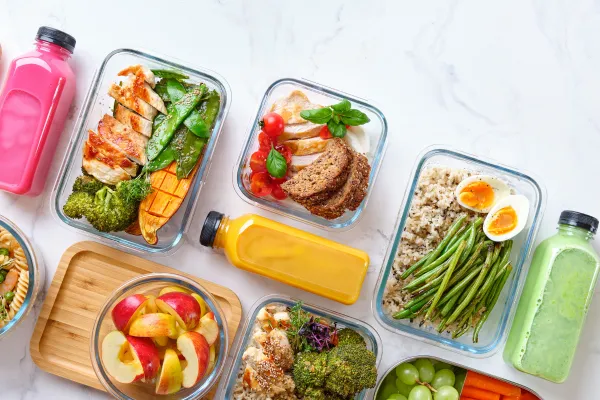
Struggling with this outcome?
You’re "eating clean” but still not losing fat.
You’re cutting carbs, skipping meals, and avoiding everything you actually enjoy but still stuck with a soft midsection.
It’s frustrating when you’re putting in the effort but nothing changes in the mirror.
You binge on the weekends and feel guilty.
You’re perfect Monday through Friday... then blow it every weekend.
One beer turns into five, one burger into a free-for-all — and by Monday you’re starting over again.
You don’t want to give up your social life just to get in shape.
Work dinners. Travel. Birthdays. Life’s full and every plan you’ve tried makes you feel like you have to choose between progress and having a life.
That’s not realistic and it’s why nothing sticks.
You’ve tried every diet and nothing seems to work for you.
Keto, fasting, carnivore, animal based… it all works for a while.
But eventually life gets in the way, you fall off, and you’re back to square one.
You don't need to work harder, you need to focus on the right principles.
Don't focus on the diet. Focus on the skill.
"Dieting” implies a temporary fix. Skill-building implies mastery.
Let’s break down how learning the skill of nutrition gives you permanent leverage:
Calories determine weight gain or loss
This is the most basic law of energy balance.
If you consume more calories than you burn → you gain weight
If you burn more than you consume → you lose weight
But here’s the skill part:
Can you recognize hunger and satiety cues? Can you adjust portions naturally when travel, stress, or training volume changes?
Mastering calorie awareness is like learning to balance your bank account — once you have it, you're in control no matter the situation.
Macros determine body composition
Where your calories come from matters.
Protein preserves and builds lean muscle
Carbs fuel training and recovery
Fats support hormones and brain function
If calories set the “budget,” macros allocate your resources.
The skill here is learning how to build meals that align with your goals — whether it’s fat loss, muscle gain, or athletic performance.
You can’t accidentally build an elite physique — but once you develop the skill of tracking, balancing, and eventually intuitively managing macros, you’ll know exactly how to adjust based on how you want to look or perform.
Micronutrients determine how you feel and how well your body functions
Micros don’t get the spotlight, but they are the operating system for your body.
Vitamins and minerals affect energy levels, digestion, mental clarity, recovery, immunity, and sleep.
Learning to prioritize whole foods, color variety, and smart supplementation is a skill that takes awareness — but it pays off with real-world vitality.
You don’t just want to look good. You want to feel good, train hard, and recover like a machine. Micros make that happen.
Bottom Line: Nutrition is a Trainable Skill
Anyone can “follow a plan” for a few weeks. But the man who learns how to:
Adjust portions and meals on the fly
Build balanced plates anywhere
Auto-regulate based on goals or stress
Eat in alignment with energy needs without obsession
...never has to start over again. He’s free to change his goals, change his body, and stay in control for life.
How to set your macros:

Get a baseline
Track your food using an app such as MyFitnessPal or Chronometer for 3-5 days eating as you normally do. Be sure to record your body weight each morning as well. Then take the average of those 3-5 days calories. Assuming your weight stayed roughly the same, this will be your maintenance calories.

Set your protein target
Your protein target will almost always stay the same regardless of your goal. This number will be roughly 1g of protein per pound of body weight. For those that have a lot of body fat to lose, use your target body weight to determine your protein goal. Example: I am a lean 190lbs, so I will aim for about 190-200 grams of protein every day.

Determine calories
Your goal will determine how you adjust your calories. If you want to lose fat you will decrease your calories by 15-25% (from your baseline maintenance level) or if your goal is to build muscle you will increase your calories by 10-20%. With your calorie goal set and your protein target set you can fill in the rest of your calories with carbs and fats. This is enough to make significant progress, however dialing in exact carb and fat targets can enhance performance and bring an elevated level of precision into your plan.
What supplements should men take?

Fish Oil
Fish oil is rich in omega-3 fatty acids (EPA and DHA), which support heart health, reduce systemic inflammation, and improve cognitive function. It’s also been shown to support joint health and aid recovery, especially for active men.

Vitamin D + K2
Vitamin D is essential for hormone production, immune support, and bone density — and most men are deficient, especially in winter months. K2 works synergistically with D to direct calcium to the bones and away from arteries, enhancing cardiovascular and skeletal health.

Magnesium
Magnesium plays a key role in sleep quality, muscle function, energy production, and stress regulation. Active individuals often burn through magnesium faster, making supplementation beneficial for recovery and nervous system health.

Creatine Monohydrate
One of the most studied and effective performance supplements, creatine improves strength, power output, muscle growth, and even cognitive function. It's safe, well-tolerated, and especially beneficial for resistance-trained men.

Whey Protein Isolate
Whey isolate is a fast-digesting, high-quality protein source that supports muscle repair, growth, and recovery. It’s convenient, easy to digest, and ideal post-workout or to hit daily protein targets when food isn’t available.

Electrolytes
Sodium, potassium, and magnesium are critical for hydration, muscle contractions, and nerve signaling. Supplementing with electrolytes — especially when sweating heavily — helps maintain performance, prevent cramps, and optimize endurance.
Nutrition Articles and Guides
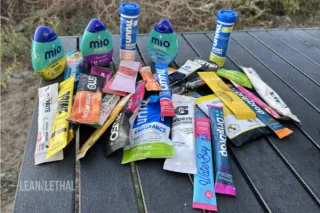
Hydration 101: What you NEED to know
This could be why you're feeling slow and underperforming. Hydration requires more than just water. Electrolyte powders like Liquid IV, BPN, and Redmond Relyte may be the answer. ...more
Nutrition ,Supplements
July 23, 2025•4 min read

How Meal Plans Keep You Stuck With Your Fitness Progress
Relying on strict meal plans is keeping men stuck in the all-or-nothing mindset. Learn why building nutrition skills is the real path to long-term results. ...more
Nutrition
July 17, 2025•3 min read

Is Alcohol Killing Your Gains?
Not sure how alcohol affects fat loss, muscle growth, recovery, and your mindset? This guide breaks down the science and shows you how to minimize the damage. ...more
Nutrition
July 08, 2025•4 min read

How Many Calories Should You Eat to Lose Fat? A Men’s Guide to TDEE & Calorie Deficit
Struggling to lose fat? This guide breaks down how many calories men really need to eat, how TDEE works, and why “starvation mode” is a myth.escription ...more
Nutrition
June 25, 2025•4 min read
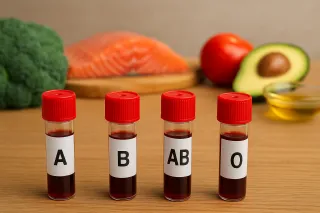
Blood Type Diet for Men: What the Science Actually Says
Explore the truth behind the Blood Type Diet. Learn what evidence-based nutrition really looks like for men focused on performance and longevity. ...more
Nutrition
June 12, 2025•3 min read

The Nutrition Coaching Egde
You're not stuck—you’re just lacking one key. Discover why nutrition coaching is the missing link for high-performing men who want real structure, results, and a body built to perform. ...more
Nutrition
June 10, 2025•3 min read
Want more than just free advice?
Let’s Build You a Body That Matches the Work You’re Already Putting In.
If you’re tired of starting over every Monday — and you’re ready for a coaching system that actually fits your lifestyle — the Lean and Lethal Project is built for you.
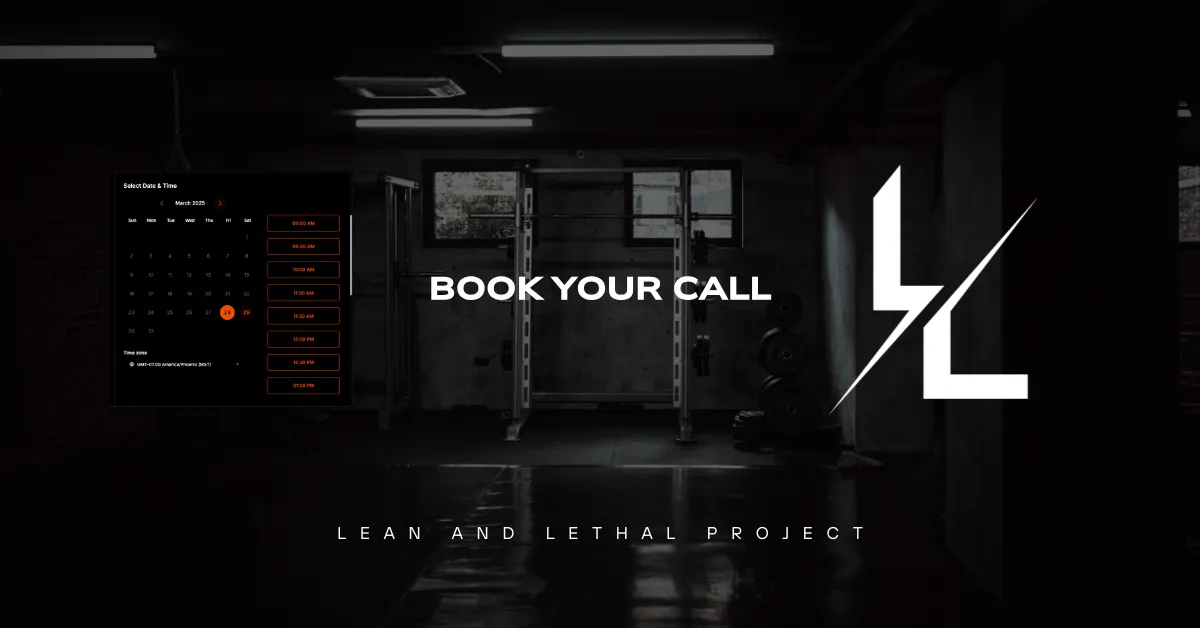
FAQs
Frequently Asked Questions
What should I eat to lose fat without losing muscle?
Focus on high-protein meals, strength training, and staying in a small calorie deficit. Don’t starve yourself — eat enough to fuel recovery and preserve muscle.
How much protein should I eat per day?
Aim for 0.8–1g of protein per pound of body weight. This supports muscle repair, recovery, and fat loss — especially during a calorie deficit.
What’s the best diet for men who want to get lean and strong?
There is no “best” diet — only one that aligns with your goals and lifestyle. We teach flexible nutrition built around proven principles, not fads.
Can I build muscle and lose fat at the same time?
Yes, especially if you’re new to training or getting back into a routine. It comes down to eating enough protein, training hard, and recovering well.
What should I eat when I travel or eat out?
Stick to lean proteins, veggies, and whole carbs when possible. Focus on portion control and don’t stress — one meal won’t ruin your progress.
Do I have to track calories or macros to see results?
Not always. We teach both tracking and non-tracking strategies. It’s about learning the skill of nutrition so you can make confident decisions anywhere.
How do I stay consistent with nutrition if I have a busy lifestyle?
Simplicity and preparation win. We help you build systems around your schedule so healthy eating becomes automatic — not overwhelming.
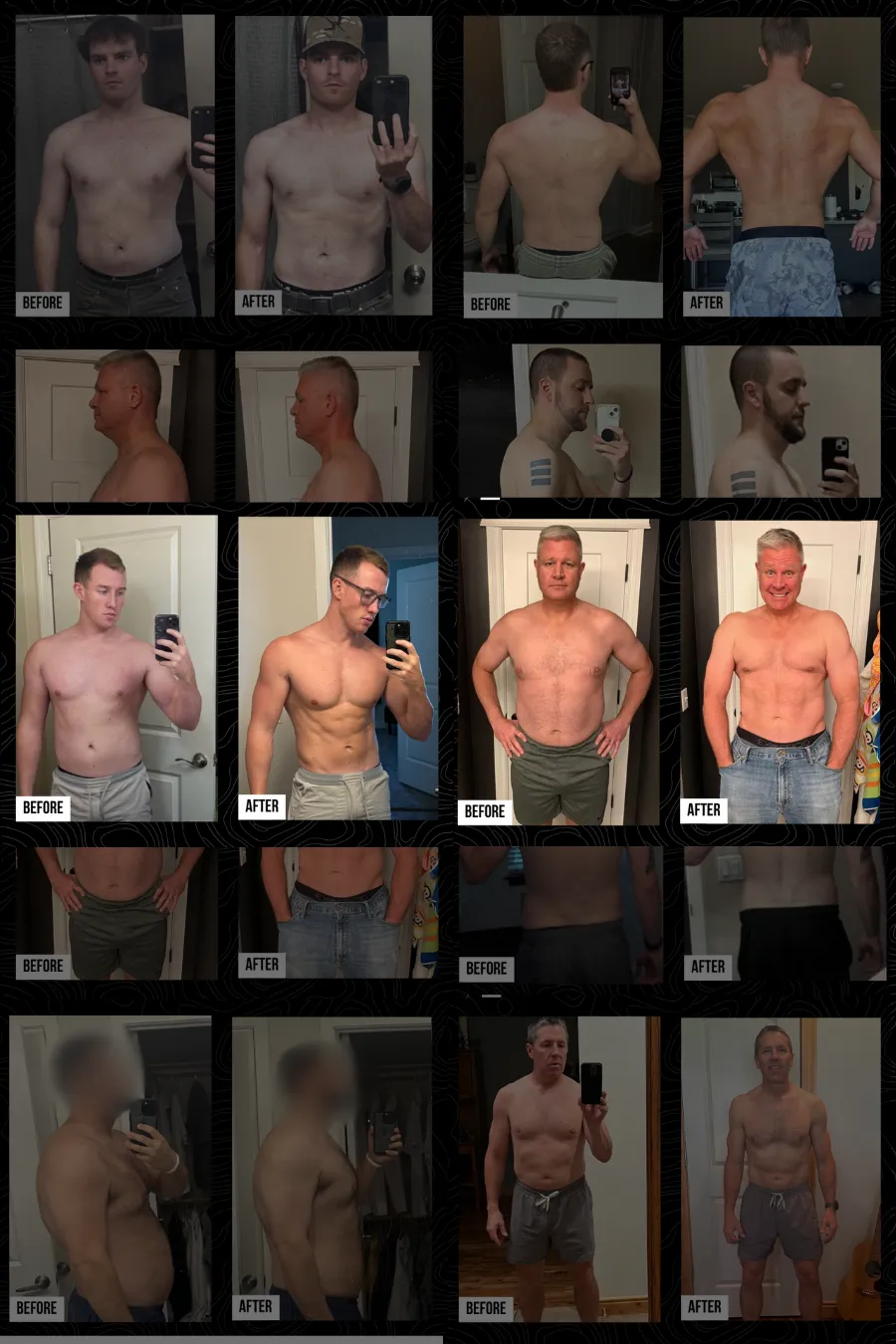
© 2026 Lean and Lethal Project - All Rights Reserved.

